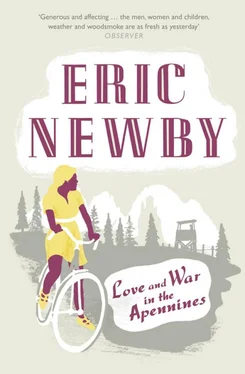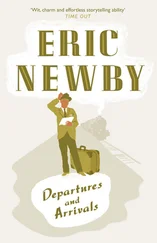1 ...8 9 10 12 13 14 ...17 ‘How dare you say that! Randolph’s a personal friend of mine!’ He spoke in exactly the same voice as one of the little boys in Children’s Hairdressing in Harrods had when I tried to get a ride on the rocking horse which he had been astride ever since I arrived. ‘Go away!’ he said to me. ‘It’s my rocking horse!’
The next morning while we were out in the courtyard being counted by the Italians I asked Alastair why he had sprung to the defence of Randolph Churchill whom he had never met and might, for all he knew, be a shit.
‘I don’t care whether Randolph Churchill’s a shit or the sun shines out of his arse,’ he said, ‘I just can’t bear little men like that saying that kind of thing. Someone had to teach him a lesson. He had it coming to him.’
The ‘little man’ he was giving the lesson to was well over six feet tall.
Although some members of the coteries could be described, without irony, as being ‘cultivated’, none by the wildest stretch of the imagination could be said to be ‘intellectual’. The intellectuals in the camp, of whom there were not many, were most of them not even marginally O.K. One, who subsequently became a very successful leader of the Italian partisans, was regarded as being what they described as ‘Bolshie and odd’; not because he was not a good soldier, which they had to admit he was, but because every opinion that he held was completely at variance with their own – about the war and why it was being fought and why he was fighting it, and about the sort of Britain which would emerge as a result of it – and, most suspicious of all, he actually learned to read and write Italian while he was in the orfanotrofio.
On the whole they weren’t great readers, although we had a large library made up of books brought from other camps which had originally been sent out by the Red Cross, books from the British library in Rome and books sent by next-of-kin which were handled by the Bodleian. Books even continued to arrive, minus their covers, after an extremely inept attempt by a then highly secretive section of the War Office (M.I.9), interested in encouraging us to escape, to send us money and maps hidden inside the boards, after which every book had its covers ripped off and had to be re-bound with cardboard from Red Cross parcel boxes before it could be read.
But although not great ones for a book, few coterie men would have dared to express themselves publicly as one late arrival did, as soon as he arrived at the camp.
‘Since I’ve been captured I’ve been locked up alone for a bit and I’ve been thinkin’,’ he said. ‘I’ve decided to take up readin’ and I’ve written to Mummy askin’ her to send me the Tatler and the Book of the Month.’
In all the time I was in the orfanotrofio I can scarcely remember a moment, except when we were eating or we were being counted, or the lights were out and we were supposed to be asleep, when the rattle of dice and the shuffling of pieces on a backgammon board could not be heard. Down below in the cellars where we ate our meals, those temporarily expatriate members of White’s Club in captivity, who themselves formed a unique inner coterie, had a big table for baccarat, at which they played after the plates had been cleared away, for the kind of stakes to which they had been accustomed in St James’s Street before the war, using the letter cards which were intended to be sent to their next-of-kin as cheques which they sent to one another’s bankers on settlement days. And later in the summer, when the exercise field, from which we all admired the girls of Fontanellato on their way to the cemetery, was opened some of them used to race corks, also for big stakes, down a minute rivulet which rose mysteriously from the earth at the top end of the field, flowed briskly for a while, and as mysteriously died away. Or else they would make a book on the running races which some lunatic organised between members of the various armies which were represented in the camp.
I ran the mile for the Eighth Army, because I needed the exercise and loathed football and basket ball. And because of the form I displayed, by the day of the meeting there was a lot of money on me, mostly placed by White’s men who had been watching me during my early morning ‘gallops’.
At the beginning of the last lap I knew that I would win. I put in a tremendous spurt and romped home. Unfortunately, I had miscounted the number of laps and there was one more to go. I finished third. I was disappointed, but not nearly so much as the little group of White’s men, shoulder to shoulder, not as I have so often seen them on race courses since the war, dressed according to season or the grandeur of the event in morning coats and top hats or flannel-suited with squashy brown felt hats pulled down over their noses and always with big race glasses, philosophically marking their race cards before setting out once more for the paddock, but still shoulder to shoulder.
‘You didn’t pull it, Eric, did you?’ one of them said as I went in to change.
At the time, only having been to a couple of trotting races, I wondered what on earth he meant.
The orfanotrofio was more like a public school than any other prison camp I was ever in. If anybody can be said to have suffered in this place it was those people who had never been subjected to the hell of English preparatory and public school life; because although there was no bullying in the physical sense – canes had been taken away for the duration, and the twisting of arms was forbidden by the Geneva Convention – there was still plenty of scope for mental torment; and although the senior officer thought he ran the camp it was really run by people elected by the coteries, just like Pop at Eton, where so many of them had been.
This state of affairs continued until a very regular full colonel arrived who had not been at Eton but at Wellington and was so horrified by the lackadaisical, demilitarised state in which he found us all, that he immediately organised the camp on the lines of an infantry battalion, in companies with company commanders. Under him the orfanotrofio began to resemble the prison camp in Renoir’s Grande Illusion. It had a commandant who was a regular colonello of the ancien régime who found himself in sympathy with our colonel, who came from the same sort of background as he did.
When one of the prisoners was found to be stealing food, a most awful crime in a prison camp where everyone started off with exactly the same amount however much more they managed to acquire by exchanging tobacco and cigarettes for it, and the problem arose of punishing him without the added and unthinkable indignity of handing him over to the Italians to keep in their cells, the colonello offered our colonel a small Italian infantry bivouac tent and a piece of parched ground in what was normally a zone that was out of bounds to us on which the sun shone all day, so that the offender could expiate his crime in solitary confinement and on a diet of bread and water provided by the British, from their rations, not by the Italians.
Some of the prisoners were very old prisoners indeed, not in age or seniority but because of the number of years they had been locked up. Most of the ‘old’ prisoners had wonderful clothes which no one who had been captured later in the war could possibly emulate, things that had been sent to them before the Italians had instituted rigid sumptuary laws for prisoners of war in order to prevent anyone having anything which vaguely resembled civilian clothes. By some technicality those who already had these clothes were allowed to keep them, providing that the larger items bore the large red patches which were sewn on to everything we wore. They had pig’s-whisker pullovers, scarves and stocks from the Burlington Arcade secured with gold pins, make-to-measure Viyella shirts, and corduroy trousers, and those who were members of the Cherry-Pickers wore cherry-red trousers. Some of this gear had reached them by way of the Red Cross and neutral embassies, but not all of it. One officer had an elegant hacking coat which had been made for him while he was a prisoner, out of a horse blanket which he had rescued from his armoured car when it went up in flames near Sollum, and which he paid the Italian tailor for with cigarettes.
Читать дальше












